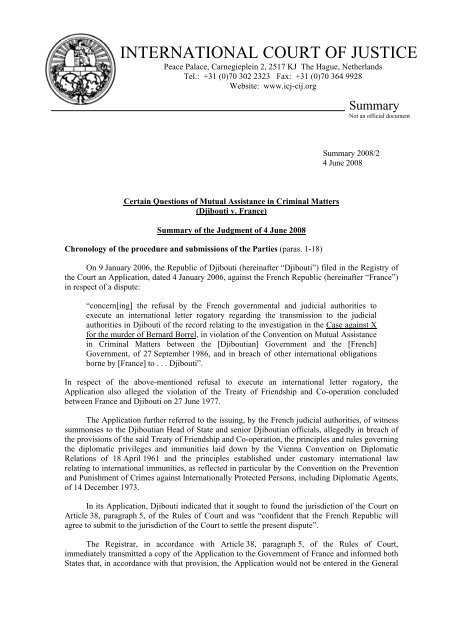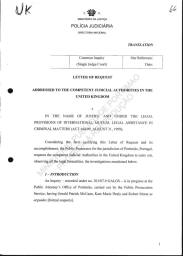The Effect of Technology on the Effectiveness of Letters Rogatory Processes
The Role of Letters Rogatory in International Legislation: Secret Insights
Letters rogatory offer as a critical tool in international regulation, facilitating cross-border legal aid by enabling territories to formally request evidence and activities from one another. What effects might these difficulties have for future lawful procedures?
Interpretation of Letters Rogatory
In the realm of global legislation, letters rogatory serve as formal demands provided by a court in one territory to seek help from a court in one more territory. Letters rogatory. These requests are specifically significant in cross-border lawful proceedings, where the enforcement of a court's order or the event of proof may be hampered due to jurisdictional constraints

The procedure normally requires the asking for court to verbalize the particular details or activity needed from the foreign court, adhering to the legal methods and conventions established in between the territories involved. As soon as provided, the letters rogatory are transmitted via diplomatic networks, which may consist of consular offices or consular offices, to make sure that the request is identified and acted upon by the international court. In general, letters rogatory exhibit the participating structure important for reliable international lawful processes.
Historic Context
Although the practice of letters rogatory has ancient origins, its formalization within the framework of worldwide regulation emerged dramatically in the 20th century. Historically, such ask for judicial aid were utilized in different lawful customs, including Roman legislation, where they facilitated cross-border teamwork in lawful matters. The principle gained renewed attention with the surge of globalization and the enhancing intricacy of worldwide lawful interactions.
The mid-20th century saw the facility of treaties and conventions that looked for to standardize the process of letters rogatory. Especially, the 1970 Hague Convention on the Taking of Proof Abroad in Civil or Commercial Matters supplied an organized method, improving the efficiency of these demands - Letters rogatory. This period marked a change from casual arrangements to a more methodical structure, which resolved the challenges positioned by differing nationwide legal systems
As states became a lot more synergistic, the demand for reliable devices to collect proof across borders emerged, strengthening the function of letters rogatory in facilitating global teamwork. Today, they remain an important tool for getting evidence and guaranteeing that justice goes beyond national borders, reflecting the evolving nature of international regulation in response to international obstacles.
Refine of Issuing Demands
The procedure of releasing letters rogatory commonly involves several crucial steps designed to ensure that ask for judicial aid are clear, details, and certified with both residential and worldwide lawful criteria. A celebration seeking aid needs to prepare a formal demand that details the essential truths of the case, the alleviation sought, and the details proof or testimony called for. This have a peek at these guys file must be crafted with accuracy to satisfy the legal requirements of the territory in which it will be sent.
Adhering to the prep work of the demand, it is submitted to the ideal authority, usually a court or an assigned governmental agency. This authority examines the request to guarantee it adheres to procedural norms and lawful standards. As soon as approved, the request is transferred to the foreign jurisdiction via diplomatic networks.
Upon receipt, the foreign court examines the request's conformity with its regional legislations and practices (Letters rogatory). If accepted, it proceeds to perform the request, which might entail the issuance of subpoenas or the collection of evidence. Throughout this procedure, keeping clear communication in between the asking for and receiving territories is crucial to make sure effective collaboration and the satisfaction of the demand
Difficulties and Limitations
Restrictions and obstacles regularly occur in the process of carrying out letters rogatory, frequently coming from varying lawful systems and treatments between jurisdictions. One considerable challenge is the varying requirements of admissibility for proof, which can bring about complications in the acceptance of documentation requested with letters rogatory. Furthermore, the absence of harmony in lawful terms and interpretations can create misunderstandings, complicating communication between courts in different countries.
Moreover, delays prevail because of administrative procedures, as the demand may need to go through several layers of legal authorities before it is satisfied. In some instances, the requested jurisdiction might do not have the essential sources or willingness to work together, even more hindering the process. Language obstacles additionally add to difficulties, as precise translation of legal records is critical for making certain that the desired message is communicated without distortion.
Finally, sovereignty issues may emerge, as some states are unwilling to adhere to demands that they regard as infringing upon their lawful autonomy. These challenges highlight the intricacies intrinsic in using letters rogatory, necessitating better harmonization and collaboration among global lawful systems to enhance their efficiency.

Effect On International Teamwork
Identifying the significance of letters rogatory in fostering worldwide teamwork is critical, as these demands facilitate cross-border legal support and advertise joint initiatives in civil and criminal matters. By enabling one jurisdiction to formally request assistance from another, letters rogatory produce a structured lawful structure that improves the effectiveness of worldwide communication between judicial authorities.
Using letters rogatory assists to develop common trust and regard amongst countries, which is crucial in a significantly interconnected globe. They function as a system not only for gathering evidence but also for ensuring that lawful procedures are maintained across borders. This is particularly essential in combating multinational criminal offense, where the inability to secure cooperation can threaten justice.
Additionally, the reliance on letters rogatory can improve complex lawful procedures, decreasing delays and unpredictabilities in worldwide investigations. The step-by-step safeguards integral in this process contribute to the defense of individual rights while promoting teamwork among check out this site states. Inevitably, the effect of letters rogatory on international participation highlights their role as essential tools in the promo of justice, promoting a collaborative spirit that goes beyond national borders and legal systems.
Verdict
In conclusion, letters rogatory act as an important tool in worldwide regulation, assisting in cross-border lawful look what i found support and participation. Despite integral difficulties such as varying bureaucratic delays and lawful standards, their standardized treatments promote depend on amongst nations. The ongoing advancement of these mechanisms is necessary for enhancing the efficiency of global lawful procedures, ultimately promoting more powerful collaboration in both civil and criminal issues throughout territories. The importance of clear interaction in this context can not be overstated.
Letters rogatory serve as a pivotal instrument in international law, helping with cross-border legal help by enabling territories to formally request evidence and activities from one an additional.The procedure normally calls for the asking for court to verbalize the certain info or activity required from the foreign court, adhering to the legal protocols and conventions developed in between the territories included. Historically, such requests for judicial support were utilized in numerous legal traditions, including Roman regulation, where they promoted cross-border participation in lawful matters.The process of issuing letters rogatory normally includes numerous important actions developed to ensure that demands for judicial aid are clear, certain, and compliant with both worldwide and domestic lawful requirements.Furthermore, delays are usual due to administrative processes, as the demand may require to pass with numerous layers of lawful authorities before it is met.